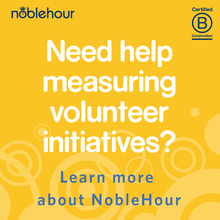This post was written by NobleHour Special Contributor Natasha Derezinski-Choo, a student at Grimsley High School in Greensboro, NC.
Around this time of year, high school graduates throw their graduation caps in the air, parents sob and wonder where the time has gone, and another generation begins their transition into adult life. For those students whose post high school plans involve higher education, the time to register for classes is quickly approaching. As students begin this new phase in their life and start thinking about their options for the first semester of college or university, service-learning should be a topic on their mind. Including service-learning courses in your college experience enhances your knowledge in a subject, benefits the community, and bridges the gap between a university lecture hall and the world waiting outside.

Service-learning differs from plain volunteerism and community service. Unlike volunteerism, service-learning incorporates topics and concepts discussed in the classroom and applies them to real world problems. Service-learning teaches through experiential learning. Students are engaged by their teachers both in the course subject area and in the ways they are challenged to use this knowledge in the greater community. Nazareth College, a place of higher education renowned for its commitment to including service in the education process, defines experiential learning as:
“Experiential learning is the process of making meaning from direct experience in a real world context. Experiential learning is a philosophy and methodology in which educators purposefully engage with learners in direct experience and focused reflection in order to increase knowledge, develop skills and clarify values. Facilitated and guided practice, reflection and evaluation are all essential components of this transformative method of learning.”
Service-learning is a unique educational tool and experience because it stimulates critical thinking and problem solving while also asking students to consider the consequences of their knowledge and their involvement in the community.
Students who opt to take service-learning courses as part of their university experience are more fulfilled and engaged in class. Students involved in service-learning are happier and more excited about their classes because they are involved in their learning and in critical thinking. Rather than just listening to lectures, students are engaged with the course material, their professors, classmates, and community. Students are also allowed to explore and act upon their values and beliefs by making an impact in the community. They develop critical thinking, problem solving, and research skills by using the knowledge they gain in the classroom to tackle real life issues. By working with others and solving complex social issues, students develop leadership and interpersonal skills, which cannot be taught through lectures and tests. By engaging students in a variety of settings, service-learning can build knowledge, character, and civic responsibility, which are useful both to the students enrolled in the course and the community they engage with.
Communities and organizations that partner with higher education institutions to develop service-learning curriculum benefit from the budding minds and dedication of young people. Service-learning has a positive place in the community by dealing with unmet needs. According to Campus Compact, a national coalition of more than 1,100 college and university presidents who are committed to fulfilling the public purpose of higher education, the top issues addressed through university service programs are K-12 education, hunger, housing and homelessness. Through service-learning, students interact with diverse groups of people and other cultures in their community. By confronting these issues and developing service projects in their classes, students become more aware of social issues and causes. They consider the causes and symptoms of these issues and how their actions can alleviate different facets of a concern in the community. In service-learning courses, students are not just asked to consider new ideas in textbooks and notes but also the different viewpoints and positions of people in their community. This allows them to be more empathetic towards others and to consider the impact that their actions in their personal, scholarly, and professional lives have on different groups in the community. Both in their course work and their free time, students learn to ensure a better future for themselves and take initiative in satisfying unmet needs in their community.
Service-learning courses can have a positive impact on a student’s future and career. Service-learning is a way of gaining professional experience, fulfilling university credit requirements, and strengthening one’s resume with service work. In many service-learning courses, students will be able to get out of the classroom and network with professionals in their field as an integral part of the coursework. Starting to build these networks while still in school can help students find internships and jobs in the future. The experience gained from service-learning classes provides a head start in the professional field and a valuable set of stories through which can help to demonstrate innovative thinking and dedication in applications or interviews. Apart from its impact on a person’s professional life, hopefully a service driven education will be a meaningful experience that compels students to continue giving back to the community in the future.
Congratulations to this year’s high school graduates. If you’re a student interested in service-learning, be sure to consider talking to your university adviser about service-learning courses and opportunities at your school. There are many colleges and universities that are engaged in service learning, and more courses are added every day. Expand the impact of your service-learning by connecting with local organizations and other students interested in creating social change.Image used under Creative Commons License via Tulane Public Relations






